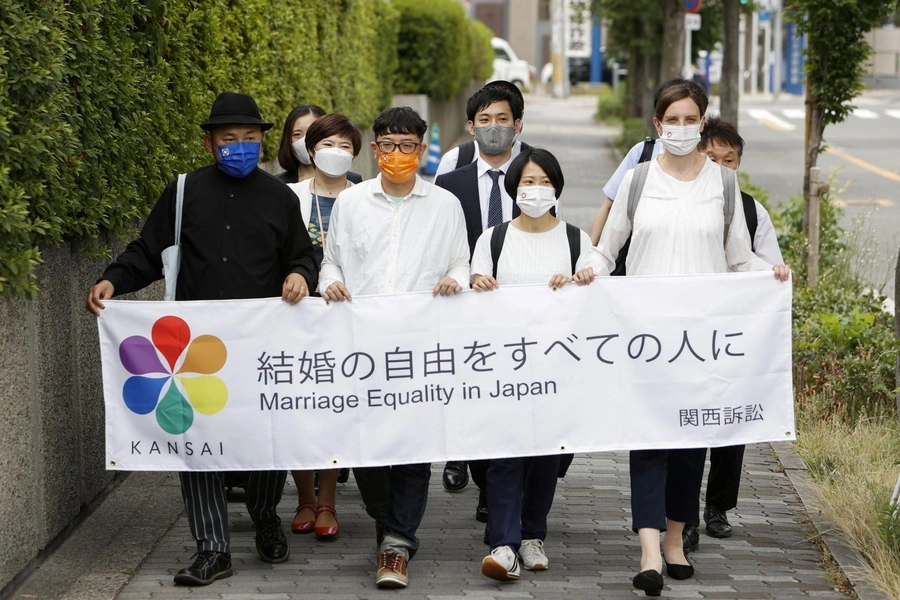Mixed Messages From Japanese Courts on Same-Sex Marriage

This summer, LGBTQ+ rights have been in the public eye in Japan. The courts and local governments have provided mixed messages for same-sex couples. On June 20, the Osaka District Court ruled against two same-sex couples who claimed that the Japanese government’s refusal to recognize same-sex marriages violated their constitutional rights. This ruling contradicted the one made by the Sapporo District Court last year, and is the second of six court cases being pursued by same-sex couples in Japanese regional courts to reach a verdict.
The presiding judge in the Osaka case, Fumi Doi (土井 文美), stated that the Japanese constitution only protects the freedom of marriage for male-female couples, referring to Article 24, which stipulates that marriage in Japan is “based on the mutual consent of both sexes.” LGBTQ+ activists have traditionally based their arguments for same-sex marriage on this article, claiming that the wording does not preclude them. This ruling, however, agreed with the common argument against same-sex marriage, that “both sexes” in this case excludes same-sex couples.
More on:
The Osaka court ruling not only refuted the arguments of the plaintiffs, but was also in direct contradiction of the ruling made by Sapporo’s District Court last year. Aside from the differing stance on the constitutionality of same-sex marriage, the Osaka court stated that the plaintiffs’ right to equality was not being violated. The court justified this decision by arguing that because same-sex couples have access to provisions outside of marriage that would allow them to do things like inherit property from a partner, their lack of ability to wed does not equate to a violation of equal rights.
The Sapporo ruling was based on Article 14 of Japan’s constitution, which guarantees equality under the law for Japanese citizens. This was notable not only for favoring the LGBTQ+ community, but also for shifting the debate away from Article 24, broadening the issue to one of equality. Four cases remain; the Osaka and Sapporo cases were filed alongside three others in Nagoya, Fukuoka, and Tokyo in 2019, and a sixth case was filed in 2021 in Tokyo with additional plaintiffs.
While the courts have become the battleground for the legal rights and protections of same-sex couples, local governments have also begun to shift their positions on civil partnerships. The Osaka ruling came less than a week after the Tokyo Metropolitan Assembly passed an amendment to the Tokyo Metropolitan Human Rights Ordinance to allow for same-sex civil partnerships throughout the city. Residents of Tokyo, who account for approximately 11 percent of Japan’s population, now have the right to seek a same-sex partnership certificate. While these certificates do not provide the full legal rights enjoyed by married heterosexual couples, they do provide limited protections to same-sex couples in renting homes together or hospital visitations.
LGBTQ+ issues have largely been addressed locally rather than via national politics. The ruling coalition of the Liberal Democratic Party (LDP) and Komeito have not prioritized LGBTQ+ equality in government policy. In 2021, when the LDP proposed a bill that would “promote understanding” of sexual minorities, it was criticized for being shallow and not providing any protections against discrimination; the LDP later dropped the bill entirely. Komeito has indicated interest in supporting same-sex marriage legislation in the past, but like the LDP has not made any moves to bring it to wider Diet discussion.
Japan’s smaller opposition parties seem more willing to bring LGBTQ+ equity concerns to the table. Going into this summer’s Upper House election, the Constitutional Democratic Party, the Japanese Communist Party, and the Social Democratic Party all included anti-discrimination and LGBTQ+ equality as a party priority. However, while four openly LGBTQ+ individuals ran for seats in the Upper House election this summer, they made up less than 1 percent of the 545 candidates, and none of them were elected to office.
More on:
LGBTQ+ activists have focused on making improvements for same-sex couples through local government ordinances while pushing for the goal of same-sex marriage through their court cases. The couples who have filed these six court cases, for instance, have the support of activist groups like Marriage for All Japan. Given the lack of support and representation in the national Diet, it seems unlikely a new law on same-sex marriage could be adopted. Instead, activists focus on the laws which govern marriage in Japan. They hope for victories in the court to compel new laws which would support same-sex couples. Decisions on the next four cases, two of which are in Tokyo, will be crucial to the future for LGBTQ+ citizens. It could be another several years before we will see an outcome from all six cases.
Erin Gallagher is the research associate for Japan Studies at the Council on Foreign Relations.
 Online Store
Online Store
